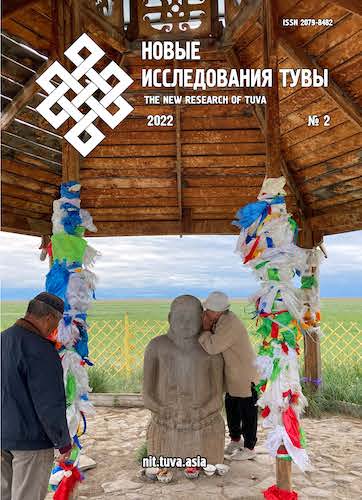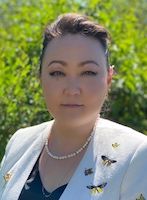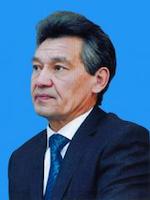The problem field of studying human development in Tuva: a survey of literature and expert opinions (2020–2021)
DOI:
https://doi.org/10.25178/nit.2022.2.1Keywords:
Tuva; population of Tuva; Tuvans; Russians in Tuva; human potential; human capital; ethnic factor; ethnocultural process; distressed region; human development indexAbstract
The article discusses some of the problems and prospects of studying human potential of the population of Tuva, as well as its development. The authors review the published books and papers on this topic, as well as the opinions of experts from public institutions, the fields of academy and research, and from among the ethnic and cultural representative unions (16 people all in all). Interviews with experts were recorded in Kyzyl from December 2020 to January 2021.
The richness of studies in the field proves the interest Tuvan scholars take in the issue and certain success they have attained. However, not infrequently their studies do little more than provide a conceptual definition of human development. Often, there is a confusion between various ideas related to human capital. Lastly, there is no common direction among the studies, and authors carry out research completely on their own, there are no systematic and integrated approaches.
Expert opinions build on research outcomes, expanding the research field to reveal a number of issues yet unstudied. It is obvious that the classical human potential index and its components will not show the specifics of this region and must be modified to include ethnocultural factors. While discussing the problems of a region’s social and economic development, we should look beyond the general social and economic processes and phenomena to discover the individual with their needs of education, jobs, healthcare and socially active life.
References
Artiukhov, I. P., Kapitonov, V. F., Novikov, O. M. and Mongush Zh. B. (2008) Mediko-sotsial'noe sostoianie semei (semeinyi chelovecheskii potentsial) Respubliki Tyva [Medical and social status of families (family human potential) of the Republic of Tuva]. Sibirskoe meditsinskoe obozrenie, no. 3, pp. 56–58. (In Russ.).
Balakina, G. F. (2011) Ekologo-etnologicheskaia kontseptsiia razvitiia de-pressivnogo regiona [Ecological and ethnological concept of development of a de-pressed region]. Regional'naia ekonomika: teoriia i praktika, no. 28, pp. 10–16. (In Russ.).
Balakina, G. F. and Begzi, A. D. (2016) Ekonomika Tuvy: vozmozhnye strategii razvitiia [The economy of Tuva: possible strategies of development]. Ky-zyl, TuvIKOPR SO RAN. 380 p. (In Russ.).
Valiakhmetov, R. M. (2015) Problemy razvitiia chelovecheskogo potentsiala Respubliki Bashkortostan [Problems of human development of the Republic of Bashkortostan]. Sotsiologicheskie issledovaniia, no. 8, pp. 50–55. (In Russ.).
Valiakhmetov, R. M. (2020) Vklad Programmy razvitiia OON v razrabotku dokladov o razvitii chelovecheskogo potentsiala v Respublike Bashktortostan [Con-tribution of the United Nations Development Program to human development re-ports in the Republic of Bashkortostan]. In: Sovremennyi mir i pravo: 75 let Organ-izatsii Ob"edinennykh Natsii [Contemporary world and law: 75 Years of the United Nations]: Proceedings of the International Scientific and Practical Conference (Ufa, September 25, 2020) / ed. by R. V. Nigmatullin. Ufa, RITs BashGU. 412 p. Pp. 175–182. (In Russ.).
Valiakhmetov, R. M., Baimurzina, G. R. and Utiasheva, I. B. (2018) Vozmozhnosti i perspektivy sotsiologicheskogo izmereniia chelovecheskogo potent-siala (na primere Respubliki Bashkortostan) [Opportunities and prospects of the so-ciological measurement of human potential: the case of the Republic of Bashkorto-stan)]. In: Rossiia reformiruiushchaiasia [Russia under reforms]. Ed. by M. K. Gorshkov. Moscow, Novyi khronograf. Issue 16. 472 p. Pp. 216–237. (In Russ.). DOI: https://www.doi.org/10.19181/ezheg.2018.10
Valiakhmetov, R. M., Baimurzina, G. R., Turakaev, M. S. and Aitov, S. G. (2018) Trudovaia migratsiia kak faktor chelovecheskogo potentsiala Respubliki Bashkortostan [Labor migration as a factor of human potential in the Republic of Bashkortostan]. Ekonomika i upravlenie, no. 6, pp. 147–156. (In Russ.).
Valiakhmetov, R. M., Baimurzina, G. R., Turakayev, M. S. and Samba A. D.-B. (2021) Etnosotsial’nye osobennosti zaniatosti naseleniia v respublikakh Tuva i Bashkortostan [Ethnic and social features of Employment in the Republics of Tuva and Bashkortostan]. New Research of Tuva, no. 4, pp. 206–222 (In Russ.). DOI: https://www.doi.org/10.25178/nit.2021.4.15
Valiakhmetov, R. M. and Turakaev, M. S. (2020) Migratsionnyi potentsial nase-leniia Respubliki Bashkortostan: osnovnye faktory i napravleniia migratsii [Migra-tion potential of the population of the republic of Bashkortostan: main directions and factors]. Research Result. Sociology and management, vol. 6, no. 4, pp. 69–86. (In Russ.). DOI: https://www.doi.org/10.18413/2408-9338-2020-6-4-0-5
Golenkova, Z. T. and Samba, A. D.-B. (2019) Proshloe, nastoiashchee i bu-dushchee sotsial'nogo prostranstva v regione [The past, present and future of social space in the region]. Informatsionno-analiticheskii biulleten' Instituta sotsiologii FNISTs RAN, no. 3, pp. 5–17. (In Russ.). DOI: https://doi.org/10.19181/inab.2019.3.1
Dabiev, D. F. and Dabieva U. M. (2015) O skorrektirovannom pokazatele indeksa razvitiia chelovecheskogo potentsiala s uchetom sotsiokul'turnykh faktorov (na primere Respubliki Tyva) [On adjusted values of the human development index taking into account socio-cultural factors: the case of the Republic of Tyva)]. Ekonomicheskii analiz: teoriia i praktika, vol. 14, issue 37, pp. 50–64. (In Russ.).
Lamazhaa, Ch. K. (2021) Sotsial'no-stratifikatsionnye protsessy v Respublike Tyva (2020) / otv. red. Z. T. Golenkova, Yu. V. Goliusova, P. E. Sushko; FNISTs RAN. M.; Kyzyl: FNISTs RAN. 128 s. [Socio-stratification processes in the Re-public of Tuva (2020) / ed. by Z. T. Golenkova, Yu. V. Goliusova, P. E. Sushko; FNISTC RAS. M.; Kyzyl: FNISTC RAS. 128 p.]. Sotsiologicheskie issledovaniia, no. 5, pp. 166–169. (In Russ.). DOI: https://doi.org/10.31857/S013216250013770-0
Oydup, T. M. and Kylgidai, A. Ch. (2021) Vypuskniki shkol kak osnova chelovecheskogo kapitala regiona: na primere Respubliki Tyva [Secondary school graduates as the basis of the human capital in the region: the case of the Republic of Tuva]. Bulletin of the Institute of Sociology, vol. 12, no. 3, pp. 176–188. (In Russ.). DOI: https://doi.org/10.19181/vis.2021.12.3.743
Samba, A. D.-B. (2020) Osnovnye izmeneniia v sotsial'no-trudovom pros-transtve Respubliki Tyva [Major changes in the social and labor space of the Re-public of Tuva]. Ekonomika i upravlenie, no. 1, pp. 47–50. (In Russ.). DOI: https://doi.org/10.34773/EU.2020.1.12
Sotsial'no-stratifikatsionnye protsessy v Respublike Tyva [Social stratification processes in the Republic of Tuva] (2020) / Z. T. Golenkova et al. ; ed. by Z. T. Golenkova, Yu. V. Goliusova and P. E. Sushko. Moscow ; Kyzyl, FCTAS RAS. 128 p. (In Russ.). DOI: https://doi.org/10.19181/monogr.978-5-89697-332-4.2020
Tarbastaeva, I. S. (2018) Tuva prevrashchaetsia v monoetnichnyi region: riski i perspektivy [Risks ans prospects of Tuva becoming a monoethnic region]. EKO, no. 5 (527), pp. 65–80. (In Russ.).
Khazhyki, A. F. (2020) Issledovanie indeksa razvitiia chelovecheskogo po-tentsiala Tuvy [A study of the Human Development Index in Tuva]. Chelovecheskii potentsial Tsentral'no-Aziatskogo regiona: perspektivy razvitiia [Human potential of the Central Asian region: development prospects] / ed. by Z. T. Golenkova. Mos-cow, FNISTs RAN. 422 p. Pp. 164–167. Federal'nyi sotsiologicheskii tsentr RAN [online] Available at: https://www.fnisc.ru/index.php?page_id=1198&id=8450 (ac-cess date: 12.02.2022) (In Russ.).
Chelovecheskii potentsial Tsentral'no-Aziatskogo regiona: perspektivy razviti-ia [Human potential of the Central Asian region: development prospects] / ed. ин Z. T. Golenkova. Moscow, FNISTs RAN. 422 p. Federal'nyi sotsiologicheskii tsentr RAN [online] Available at: https://www.fnisc.ru/index.php?page_id=1198&id=8450 (access date: 12.02.2022) (In Russ.).
Published
How to Cite
For citation:
Lamazhaa Ch. K., Valiakhmetov R. M. and Samba A. D.-B. Problemnoe pole issledovanii chelovecheskogo potentsiala Tuvy: obzor literatury i mneniia ekspertov (2020–2021) [The problem field of studying human development in Tuva: a survey of literature and expert opinions (2020–2021)]. New Research of Tuva, 2022, no. 2, pp. 6-19. (In Russ.). DOI: https://www.doi.org/10.25178/nit.2022.2.1
Issue
Section

This work is licensed under a Creative Commons Attribution-NonCommercial 4.0 International License.

Author(s) license holder(s) grant rights for their work to the journal (grantee of a license) under the simple non-exclusive open license in accordance with Art. 1286.1 «Open license for a research work, work of literature or fine arts», Civil Code of the Russian Federation.
New Research of Tuva publishes articles under the Creative Commons Attribution-NonCommercial license (CC BY-NC).
Since it is an open license, author(s) reserve the right to upload the article to their institutional repository, submit it to another journal (if it allows republications), or republish it on their own website (in full, or in part).
However, several conditions apply here:
a) The republished version must always contain the name(s) and affiliation(s) of the author(s), the original title and the hyperlink to the original version on the New Research of Tuva website;
b) It must be in open access, free of charge, and no category of readers must be in any way whatsoever advantaged over general readership.
c) should the contribution be submitted elsewhere by its author(s) without substantial modification (30% or more of original text unchanged), the body of the article should contain a disclaimer that the original version was published in New Research of Tuva (with a link to the respective page)
The CC-BY-NC is a non-revocable license which applies worldwide and lasts for the duration of the work’s copyright.











